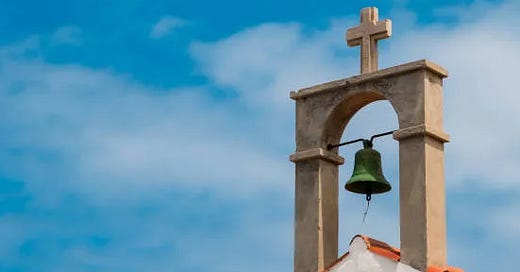They say the old man’s name was Elias Crow, though it had been so long since anyone called him by it that the name felt more like folklore than fact. He lived alone in a shack at the base of Coyote Bluff, where the land sloped upward to a crumbling adobe chapel. The chapel hadn’t seen a congregation since the silver dried up and the miners scattered like leaves in a storm. But the bell still rang.
Every evening at sundown, Elias climbed the slope with a limp and a lantern, his back bent like a bow, his hat pulled low. He’d unlatch the chapel door, step inside, and pull the frayed rope until the bell sang once. Just once. Then he’d sit a while, staring at the horizon until the stars began to gather like dust.
No one knew why he did it. The sound carried far across the desert. Travelers passing through would pause, sometimes unsettled by the toll, unsure whether it marked a death or something stranger still.
One spring, when the wind came soft and the mesquite bloomed early, a boy from a wagon train wandered up the bluff. He’d slipped away unnoticed while the others fixed a broken axle down below. Elias heard the crunch of boots and turned. The boy was no older than ten, red-haired, with a face that hadn’t yet decided whether to be afraid.
“What you doin’ up here, mister?” the boy asked.
Elias stared a moment, then said, “Tending to the day.”
“You live here?”
“I do.”
“You got any water?”
Elias nodded. “Come.”
They sat in the chapel’s shadow, sharing a dented canteen. The boy’s eyes kept drifting to the bell, hanging cracked and black above them.
“Why you ring it?” he finally asked.
Elias took his time answering. “Used to be a town here. Miners, mostly. Some good folk, some not. My wife taught in the schoolhouse. Bell rang for weddings, funerals, Sundays. Then came the fire, then came the leaving.”
The boy blinked. “So you ring it for her?”
Elias looked at the sky. “Maybe. Or maybe I ring it for the dead. Or the lost. Or just for anyone still listening.”
The boy was quiet for a long while. “Can I ring it?”
Elias shook his head, gentle. “Not yet. One day, maybe.”
Voices echoed up from below—the boy’s family calling, worried. He stood, brushing dust from his pants.
“I gotta go.”
Elias nodded. “Go on, then.”
The boy paused. “I’ll come back.”
Elias smiled, the kind of smile that hurts more than it shows. “Hope so.”
The boy ran down the hill and was gone.
Years passed. The desert did what deserts do—it swallowed. The chapel caught fire one night, though no one knows how. The bell cracked in the heat and fell, splitting the stones below.
When the boy returned, grown and road-worn, he found nothing but scorched timber and silence. No shack. No Elias. Just the bell, lying crooked in the dirt, half-buried by time.
He stood there a long while, feeling the heat of the sun in his teeth.
Then he saw it—etched into the stone near where the bell had once hung. Faint, shallow, but unmistakable:
Keep ringing.
He didn’t smile. He didn’t cry. He just sat beside the ruin until the stars came out, listening for a sound he knew would never come again.
Want to read some more? Enjoy one of these recent posts:
How I Barely Survived My First (12) Days on Substack
Creating When Words Confound You






Really enjoyed this! Enough intrigue to wonder, enough unsaid to let the reader wonder.